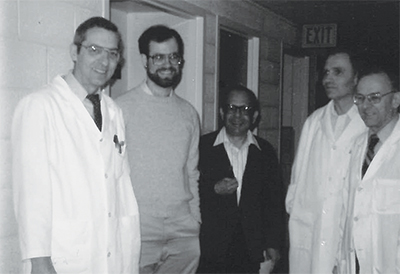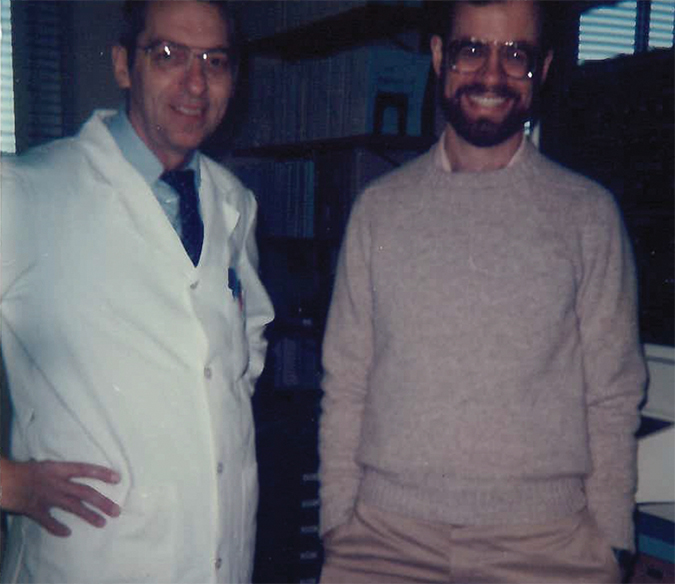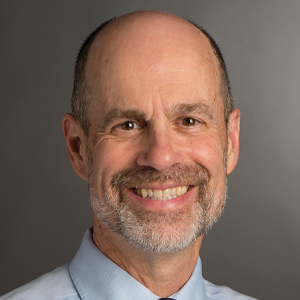Finding the help you need
 In a photo from the early 1980s, Paul Craig, second from left, is shown with his research adviser, Eugene E. Dekker, left, and Prasanta Datta, Harry Winter and Thomas Riggs at the University of Michigan.courtesy of Paul Craig
In a photo from the early 1980s, Paul Craig, second from left, is shown with his research adviser, Eugene E. Dekker, left, and Prasanta Datta, Harry Winter and Thomas Riggs at the University of Michigan.courtesy of Paul Craig
Failure. None of us want to encounter it or admit it has happened, but it’s a part of the career of every successful scientist. This article is written specifically for students who hope to embark on that career, to help you deal with and overcome failure wherever you are on your path.
My story
When I was an undergraduate student, I experienced the faculty as people who challenged me but in a supportive way. They expected everyone to succeed and graduate. My teachers encouraged me, and I received lots of positive feedback.
Graduate school was different.
I was the first person in my family to pursue a graduate degree. I was so naive that I appeared for my grad school interview in a suit — I thought that was how it was done. I had a strong undergraduate record, so I had been a big fish in a small pond. When I arrived at graduate school, I found that I was an average student, and it seemed to me that others in my class had arrived with much better preparation.
The pressure of grad school was new to me and not comfortable at all. Up to that point, going to school was all about getting good grades. Now I had started on a path for which the roadmap was unclear. (This is one reason I am such a strong supporter of undergraduate research — I want my students to learn early in their careers how to respond when the answer to a question is not known.)
The faculty members were all good people, but they were driven by the need for success and productivity in terms of papers, grants and reputation. I sensed the pressure they felt to publish and win grants. I soon realized that I was part of a larger system that was expected to be successful. I saw that a significant number of students did not complete their degrees.
I went home for Christmas break after my first semester uncertain whether I would return. It had been a difficult term — for the first time, I did not have any family nearby, so I was quite lonely.
I did return, and I remember one event from the following summer very well. My aunt and uncle visited Michigan in August, and they invited me to go with them to Greenfield Village and the Henry Ford Museum in Dearborn. It had been a tough summer — research was new to me, and I was making very little progress. When I went to meet them, I wasn’t sure if I would laugh or burst into tears. We ended up having a wonderful time.
I struggled a bit with classes in my second year but was able to pass my qualifying exams to become a Ph.D. candidate the following June. That was when the real struggles began.
I had picked up a project that involved characterizing an enzyme that a previous graduate student from my lab had purified. The procedure was clearly written out, and the prior student had repeated the purification successfully a number of times. It should have worked on the first try if I followed the directions properly, but it didn’t. It also didn’t work on multiple attempts over the next twelve months, and I grew despondent. My advisor was on sabbatical. I kept sending him reports about my failures, and he wrote back long letters that were encouraging but also questioned my motivation. I still have those letters, but I have been unable to read them again.
I needed help to deal with the emotional impact of failure.
Fortunately, I was not isolated. As a practicing Christian, I looked for fellowship with other believers. That summer I was living in a training/discipleship house with about 30 young men led by a few older men. Perhaps it was the testosterone in the air, but every night as we ate supper together, people talked about their personal and professional successes. I was heartbroken because I had none to share. I remember the night when one of the house leaders asked me why I was so quiet at suppertime. I told him it was because I had no successes to report. He challenged me to share my failures and to ask the others for help and prayer. So I did the next night. My friends surrounded me, encouraged me and promised to continue praying for me.
Things did not change immediately, but I lost my hopeless feeling and started looking for solutions. I found a recently published paper that pointed me in a new direction for purifying the enzyme. It took about two months of methodical effort to work out a new purification scheme and another two months to convince my professor that this was the right thing to do.
From that point, it took another two-and-half years to complete my graduate work, but that was more about learning persistence than fear of failure.
What I’ve learned
Each of us has unique experiences in our careers. In my story, I emphasize the role of my faith because it was central to my experience. I hope that aspect of my story doesn’t lead you to dismiss the discouragement, loneliness and challenges I faced for the first time when I entered graduate school. I believe these are common experiences for people in all walks of life and certainly for those pursuing scientific careers. I also experienced encouragement, voices of wisdom and love.
 Paul Craig, right, is pictured with Eugene E. Dekker, his research adviser at the University of Michigan, in the early 1980s.courtesy of paul craigIn graduate school, you will be surrounded by lots of talented people: established investigators who have been publishing and overseeing funded research for decades; the new stars — assistant professors who just completed postdocs with famous scientists and are on a path to greatness; talented postdocs; and more senior grad students. They all know more than you do, and many of them have what you want — a life as a scientist, including the pursuit of knowledge in a stable career that, perhaps, one day will include recognition at the local or even national level. You will start out with other new and talented students who share your dreams. To reach those dreams, you need to work hard. You will encounter frequent challenges, and sometimes they will be more than challenges. I hope my story will encourage you to find the help you need as you pursue those dreams.
Paul Craig, right, is pictured with Eugene E. Dekker, his research adviser at the University of Michigan, in the early 1980s.courtesy of paul craigIn graduate school, you will be surrounded by lots of talented people: established investigators who have been publishing and overseeing funded research for decades; the new stars — assistant professors who just completed postdocs with famous scientists and are on a path to greatness; talented postdocs; and more senior grad students. They all know more than you do, and many of them have what you want — a life as a scientist, including the pursuit of knowledge in a stable career that, perhaps, one day will include recognition at the local or even national level. You will start out with other new and talented students who share your dreams. To reach those dreams, you need to work hard. You will encounter frequent challenges, and sometimes they will be more than challenges. I hope my story will encourage you to find the help you need as you pursue those dreams.
As you engage in a scientific career, your life will be filled with ups and downs. In academia, papers are accepted or rejected. For most of us, grants are rejected more often than they are funded. We face anxiety as we seek tenure (in academia) and promotion (everywhere).
Our lives have great potential for joy, but here I am focused on the challenges the scientific life brings. Failure is part of our lives. We must learn how to cope so that it is only a temporary state.
If you enjoyed reading this article, please feel free to reach out to Paul.
Five things you need
I’d like to share a few things I’ve learned about surviving and thriving.
| 1. |
Have a sense of personal well-being and fulfillment. This is discussed at length in Great Jobs, Great Lives, a study by Purdue University and Gallup. This survey of 30,000 college graduates measured the impact of different factors on preparing undergraduates to become fully engaged in their careers. They identified five elements of well-being (quoted here) and found a direct correlation between engagement at work and the number of elements found to be present in the life of the graduates, according to the Gallup-Healthways Well-Being Index.
|
||||||||||
| 2. | Get honest with someone, particularly your advisor. Over time, I found that the more honest I was with my advisor, the better things went for me. If things were not working, I needed to assess the failure, try some solutions and present my findings without excuse or justification. We could then look together at the cold, hard facts and decide the best next steps. | ||||||||||
| 3. | Find a support group and stick with it. My support group was my faith community, but there are many other choices. One of my friends in graduate school practiced aikido, which for him combined physical and spiritual well-being. Unfortunately, some of us find ourselves drawn to the dangerous excesses of addiction. The January 2017 issue of ASBMB Today contains a wonderful essay about ongoing recovery from addiction titled “A Journey to Sobriety” by Dr. 24hours. If you are drawn to abuse alcohol or other substances or find yourself involved in compulsive gambling or sexual behavior, you may be able to seek help from a 12-step group, such as Alcoholics Anonymous. | ||||||||||
| 4. | Stay connected to your family. My move to graduate school left me isolated from family. I finally became desperate enough to look up some more-distant relatives. Eventually, I met a second cousin, and we became fast friends. His farm became a weekend retreat for me while I was finishing my Ph.D. and completing my postdoc. | ||||||||||
| 5. | Be open to real connections from unexpected sources. During my last year of graduate school, I was asked to host a biochemistry graduate student from North Carolina who was visiting a Christian fellowship that I had joined. Bob Bateman and I quickly became fast friends, and he has stood beside me in many challenging and joyful situations. I remember calling him when I was awaiting my tenure decision. He urged me to stop talking so fast. Then he pointed out that I would have my family and friends no matter how that decision turned out. We have shared many wonderful moments together with our families over the last 34 years. I continue to be grateful for his friendship, advocacy and advice, even though I never expected to meet him. |
Enjoy reading ASBMB Today?
Become a member to receive the print edition four times a year and the digital edition monthly.
Learn moreGet the latest from ASBMB Today
Enter your email address, and we’ll send you a weekly email with recent articles, interviews and more.
Latest in Opinions
Opinions highlights or most popular articles

Women’s health cannot leave rare diseases behind
A physician living with lymphangioleiomyomatosis and a basic scientist explain why patient-driven, trial-ready research is essential to turning momentum into meaningful progress.

Making my spicy brain work for me
Researcher Reid Blanchett reflects on her journey navigating mental health struggles through graduate school. She found a new path in bioinformatics, proving that science can be flexible, forgiving and full of second chances.

The tortoise wins: How slowing down saved my Ph.D.
Graduate student Amy Bounds reflects on how slowing down in the lab not only improved her relationship with work but also made her a more productive scientist.

How pediatric cataracts shaped my scientific journey
Undergraduate student Grace Jones shares how she transformed her childhood cataract diagnosis into a scientific purpose. She explores how biochemistry can bring a clearer vision to others, and how personal history can shape discovery.

Debugging my code and teaching with ChatGPT
AI tools like ChatGPT have changed the way an assistant professor teaches and does research. But, he asserts that real growth still comes from struggle, and educators must help students use AI wisely — as scaffolds, not shortcuts.

AI in the lab: The power of smarter questions
An assistant professor discusses AI's evolution from a buzzword to a trusted research partner. It helps streamline reviews, troubleshoot code, save time and spark ideas, but its success relies on combining AI with expertise and critical thinking.

